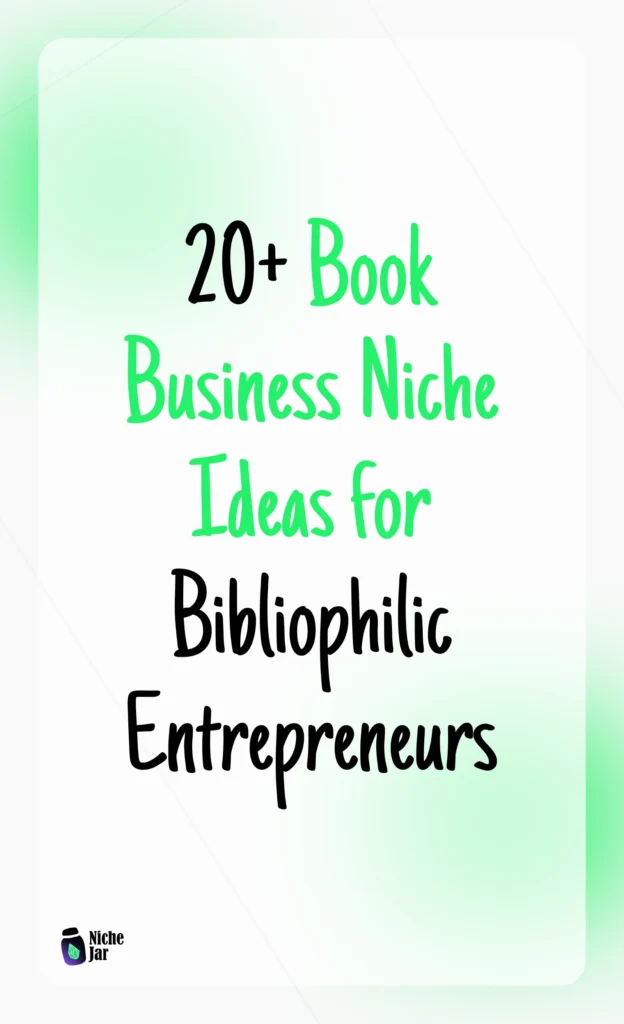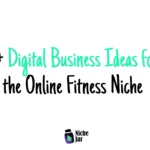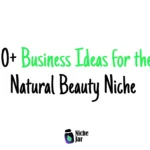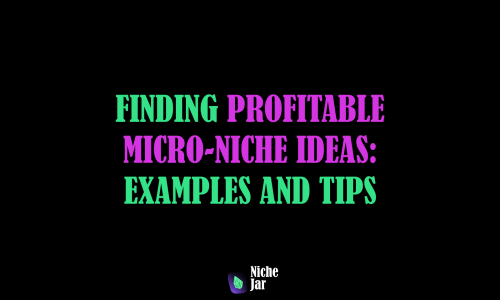- Senia
- 0 Comments
- 1155 Views
Do you love books and wish you could turn that passion into a thriving business? From what I’ve seen, the book industry is full of opportunities for bibliophilic entrepreneurs to create meaningful income streams. If you’re exploring book business niche ideas, this guide will offer practical insights, strategies, and inspiration to help you start small and grow steadily.
Books have always held a special place in our lives. From igniting imagination to providing practical knowledge, books shape perspectives and connect communities. For entrepreneurs, the book industry offers an array of business opportunities—both traditional and digital—that cater to readers, collectors, writers, and educators alike.
From what I’ve observed, many successful book businesses start by identifying a specific niche rather than trying to serve everyone. For instance, focusing on rare books, educational resources, or literary merchandise can help you stand out in a competitive market. Additionally, the rise of digital platforms has made it easier to reach global audiences with minimal upfront costs.
In this post, I’ll explore 20+ Book Business Niche Ideas for Bibliophilic Entrepreneurs, providing detailed steps, potential challenges, estimated startup costs, and real-world examples where possible. Whether you want to sell physical books, create digital content, or offer services for readers, this guide aims to give you actionable ideas that fit various budgets and skills.
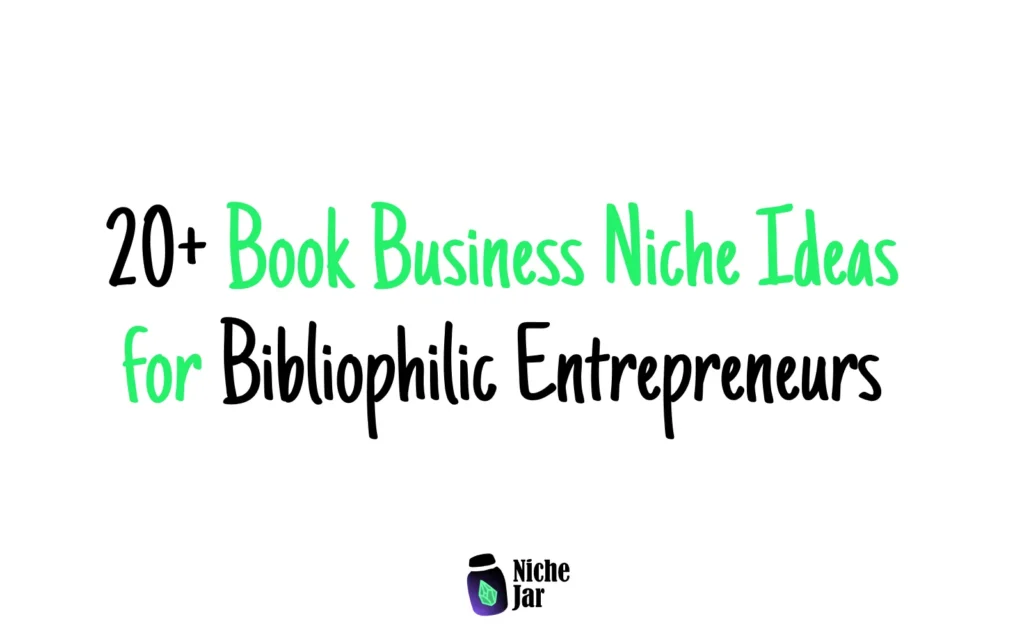
1. Rare and Collectible Book Sales
Description: Buy, sell, or trade rare and collectible books.
Insights: Collectors pay premium prices for first editions, signed copies, and antique books.
Practical Tips:
- Source books from auctions, estate sales, or online marketplaces.
- Authenticate items and maintain detailed condition reports.
- Build an online store or use platforms like eBay and AbeBooks.
Challenges & Solutions: Risk of counterfeit or damaged items—verify authenticity and handle with care.
Startup Costs: $500–$3,000 (initial inventory, authentication tools, website).
Monetization: Direct sales, auctions, consignment fees.
Example: A collector started small on eBay and now has a niche audience willing to pay high prices for rare editions.

2. Niche Online Bookstore
Description: Sell books online with a focus on a specific genre or audience.
Insights: Specialization builds loyalty among readers looking for curated selections.
Practical Tips:
- Choose a niche: mystery, sci-fi, cookbooks, or local authors.
- Partner with distributors or small publishers.
- Offer personalized recommendations and bundles.
Challenges & Solutions: High competition—differentiate with curation and customer service.
Startup Costs: $300–$1,500 (website, inventory, marketing).
Monetization: Book sales, memberships, exclusive editions.
Example: A sci-fi online bookstore built a dedicated following and sold exclusive signed copies, generating consistent revenue.
3. Book Subscription Boxes
Description: Deliver curated books and literary goodies to subscribers each month.
Insights: Subscription models generate recurring revenue and strong customer engagement.
Practical Tips:
- Curate items for a specific audience (children, mystery lovers, classics).
- Include bookish merchandise like bookmarks, mugs, or prints.
- Use social media to showcase unboxing experiences.
Challenges & Solutions: Retention—keep boxes fresh, themed, and exclusive.
Startup Costs: $500–$2,000 (first box inventory, packaging, marketing).
Monetization: Monthly subscriptions, gift boxes.
Example: A children’s book subscription box gained 200 subscribers in the first three months by partnering with schools.

4. eBook Publishing and Sales
Description: Write and sell digital books through platforms like Amazon Kindle, Apple Books, or your website.
Insights: Low-cost entry and wide reach make eBooks accessible for new entrepreneurs.
Practical Tips:
- Focus on niche topics or genres.
- Invest in professional cover design and formatting.
- Promote via social media, email lists, and book blogs.
Challenges & Solutions: High competition—optimize for niche keywords and quality content.
Startup Costs: $50–$500 (cover design, editing, marketing).
Monetization: Direct eBook sales, bundle offers, cross-promotions.
Example: An author self-published a niche cooking guide and sold 1,000 copies in the first two months via Instagram promotions.
5. Print-on-Demand Books
Description: Offer physical books without maintaining inventory by using print-on-demand services.
Insights: POD reduces financial risk and allows for testing niche markets.
Practical Tips:
- Use platforms like Amazon KDP, Lulu, or Blurb.
- Focus on niche topics or specialized journals.
- Promote using social media ads and content marketing.
Challenges & Solutions: Shipping speed and quality—choose reliable POD partners.
Startup Costs: $100–$300 (account setup, marketing).
Monetization: Book sales, bundles, custom editions.
Example: A travel-themed journal business sold 500 copies in six months by targeting travel bloggers.
6. Audiobook Production
Description: Produce and sell audiobooks or offer production services for authors.
Insights: Audiobooks are rapidly growing in popularity among commuters and multitaskers.
Practical Tips:
- Invest in quality microphones and recording software.
- Offer voiceover services for self-publishing authors.
- Distribute through Audible, iTunes, or your website.
Challenges & Solutions: Audio quality—record in a quiet space and edit carefully.
Startup Costs: $300–$1,000 (equipment, software, hosting).
Monetization: Sales of audiobooks, production services.
Example: A freelance narrator produced 10 audiobooks for niche non-fiction authors, earning a steady monthly income.

7. Book Blogging and Affiliate Marketing
Description: Create a blog reviewing books, sharing reading lists, and promoting literary products.
Insights: Blogging builds authority and can be monetized through affiliate links and sponsored posts.
Practical Tips:
- Focus on niche topics like fantasy, educational, or children’s books.
- Write long-form, SEO-optimized content.
- Integrate affiliate programs like Amazon Associates.
Challenges & Solutions: Slow initial traffic—use social media and guest posts to grow readership.
Startup Costs: $50–$300 (domain, hosting, marketing).
Monetization: Affiliate commissions, sponsored content, digital products.
Example: A book blogger earned $1,000/month promoting educational workbooks and online courses.
8. Book Reviewing and YouTube Channels
Description: Share book reviews, reading tips, and literary commentary on YouTube.
Insights: Video content is highly engaging, especially for visual audiences.
Practical Tips:
- Focus on a niche (young adult, self-help, or classics).
- Maintain consistent posting schedules.
- Collaborate with authors and publishers for exclusive content.
Challenges & Solutions: Competition—develop a unique voice and style.
Startup Costs: $200–$1,000 (camera, microphone, editing software).
Monetization: Ads, sponsored videos, affiliate links, merchandise.
Example: A YouTube channel focused on historical fiction gained 10,000 subscribers in the first year and earned through affiliate book sales.
9. Literary Podcasting
Description: Host a podcast discussing books, authors, and literary trends.
Insights: Podcasts allow deep engagement and can reach global audiences.
Practical Tips:
- Keep episodes 20–40 minutes.
- Interview authors or literary experts.
- Promote episodes on social media and podcast platforms.
Challenges & Solutions: Building listeners—cross-promote with blogs, YouTube, or newsletters.
Startup Costs: $100–$500 (microphone, hosting).
Monetization: Sponsorships, affiliate links, premium content.
Example: A literary podcast gained 5,000 listeners per episode and monetized through book sponsorships.

10. Book Coaching and Editing Services
Description: Offer services to help authors improve their manuscripts, from coaching to editing.
Insights: Many writers need guidance before self-publishing or submitting to publishers.
Practical Tips:
- Offer developmental editing, copyediting, and coaching packages.
- Set up an online booking system for consultations.
- Market services on writing forums, social media, and LinkedIn.
Challenges & Solutions: Finding clients—offer free initial consultations or sample edits.
Startup Costs: $100–$500 (website, marketing, editing tools).
Monetization: Hourly rates, package fees, subscription coaching.
Example: A freelance editor started with 5 clients and gradually built a 20-client roster through word-of-mouth and online communities.
11. Self-Publishing Consultancy
Description: Help aspiring authors navigate self-publishing platforms and strategies.
Insights: Self-publishing is booming, but authors often need guidance on formatting, marketing, and distribution.
Practical Tips:
- Create step-by-step guides or video tutorials.
- Offer services for eBook formatting, cover design, and publishing support.
- Host webinars or workshops for ongoing client engagement.
Challenges & Solutions: Competition—focus on specific niches like fiction, children’s books, or non-fiction.
Startup Costs: $200–$1,000 (website, marketing, tools).
Monetization: Consulting fees, course sales, affiliate partnerships with POD platforms.
Example: A self-publishing consultant helped 15 authors publish their first books within a year, generating steady consulting income.
12. Children’s Books Specialization
Description: Focus on publishing or selling children’s books, from picture books to middle-grade novels.
Insights: Parents and educators are a consistent audience seeking quality, age-appropriate content.
Practical Tips:
- Partner with illustrators or create your own stories.
- Offer themed collections or educational tie-ins.
- Sell online, in schools, or via subscription boxes.
Challenges & Solutions: Standing out—create unique illustrations or interactive formats.
Startup Costs: $500–$2,000 (illustrations, printing, marketing).
Monetization: Book sales, digital editions, licensing for educational content.
Example: A small publisher launched a 4-book children’s series and sold 1,000 copies in the first year by targeting school libraries.

13. Educational Workbooks and Study Guides
Description: Develop educational materials that complement books or curricula.
Insights: Parents and teachers seek resources that make learning interactive and engaging.
Practical Tips:
- Focus on subjects or age groups with high demand.
- Include downloadable PDFs, interactive exercises, or printables.
- Market through schools, online communities, or educational blogs.
Challenges & Solutions: Ensuring accuracy—collaborate with educators or subject experts.
Startup Costs: $100–$500.
Monetization: Direct sales, bundles with related books, subscriptions.
Example: A freelance educator sold 500 printable workbooks online within six months.
14. Book-themed Merchandise
Description: Sell merchandise like bookmarks, tote bags, mugs, or literary prints.
Insights: Fans love items that celebrate their favorite books or authors.
Practical Tips:
- Use print-on-demand services to reduce inventory costs.
- Create items that appeal to a specific niche, such as fantasy, classics, or YA readers.
- Promote via social media and book blogs.
Challenges & Solutions: Standing out—design unique, visually appealing products.
Startup Costs: $200–$1,000.
Monetization: Product sales, bundles with books or subscriptions.
Example: A small Etsy shop sold 300 book-themed mugs in the first three months.
15. Virtual Book Clubs and Workshops
Description: Host online book discussions, writing workshops, or reading events.
Insights: Readers enjoy community and guided discussion.
Practical Tips:
- Use Zoom, Google Meet, or Discord to host events.
- Charge membership fees or per-event tickets.
- Offer themed sessions, author Q&As, or writing prompts.
Challenges & Solutions: Engagement—keep groups small and interactive, encourage participation.
Startup Costs: $50–$200 (platform subscriptions, marketing).
Monetization: Memberships, event fees, sponsorships.
Example: A virtual book club attracted 100 monthly subscribers within a year.

16. Author Interviews and Content Creation
Description: Create content featuring author interviews, behind-the-scenes insights, and book promotion.
Insights: Readers love insider access, and authors need visibility.
Practical Tips:
- Publish interviews on blogs, podcasts, or social media.
- Offer written, audio, or video formats.
- Collaborate with local or independent authors.
Challenges & Solutions: Scheduling—plan in advance and batch content creation.
Startup Costs: $50–$300 (recording equipment, website).
Monetization: Sponsored content, affiliate sales, ads.
Example: A blog featuring author interviews built a niche following and monetized through affiliate links to the featured books.
17. Book Cover Design Services
Description: Offer specialized design services for authors needing professional book covers.
Insights: A compelling cover significantly impacts book sales.
Practical Tips:
- Master design software or hire freelance designers.
- Understand genre-specific trends.
- Showcase a portfolio online.
Challenges & Solutions: Competition—highlight niche expertise and unique design style.
Startup Costs: $200–$1,000 (software, website, portfolio).
Monetization: Per-project fees, package deals for multiple services.
Example: A designer focused on fantasy novels secured clients from self-published authors worldwide.
18. Writing Courses and Online Programs
Description: Teach writing, self-publishing, or book marketing through digital courses.
Insights: Aspiring authors seek structured guidance to improve skills and launch books.
Practical Tips:
- Break courses into modules with clear objectives.
- Offer interactive elements like quizzes, assignments, or live sessions.
- Use platforms like Teachable, Udemy, or your website.
Challenges & Solutions: Marketing—build email lists, leverage social media, and partner with writing communities.
Startup Costs: $300–$2,000 (course creation, platform, marketing).
Monetization: Course fees, memberships, premium content upsells.
Example: A self-publishing course attracted 200 students in the first year, generating $10,000 revenue.

19. Book Restoration and Repair Services
Description: Restore and repair old or damaged books for collectors and libraries.
Insights: Book preservation is essential for rare or sentimental volumes.
Practical Tips:
- Learn bookbinding and restoration techniques.
- Offer services locally or via mail for rare collections.
- Market to collectors, libraries, and historical societies.
Challenges & Solutions: Skill-intensive—take courses and practice before accepting paying clients.
Startup Costs: $500–$2,000 (tools, materials, training).
Monetization: Service fees, restoration workshops.
Example: A local bookbinder restored 50 rare books in the first year, building repeat clientele.
20. Local Pop-up Bookshops
Description: Set up temporary book sales events in cafes, fairs, or markets.
Insights: Pop-ups build local brand awareness and provide direct customer interaction.
Practical Tips:
- Curate books around a theme or genre.
- Offer exclusive deals, signed copies, or book bundles.
- Collaborate with local authors or illustrators.
Challenges & Solutions: Logistics—plan locations, permits, and inventory carefully.
Startup Costs: $200–$1,000 (inventory, setup, marketing).
Monetization: Direct sales, event sponsorships, book signings.
Example: A pop-up shop selling mystery novels sold 150 books over two weekends.
21. Literary Event Planning and Online Conferences
Description: Organize virtual or in-person literary events, readings, or conferences.
Insights: Authors and readers are eager for networking and learning opportunities.
Practical Tips:
- Plan themes, speakers, and interactive sessions.
- Use event platforms like Zoom, Hopin, or local venues.
- Offer sponsorships and ticketed access.
Challenges & Solutions: Coordination—use project management tools and volunteers.
Startup Costs: $500–$3,000 (platform, marketing, speaker fees).
Monetization: Ticket sales, sponsorships, premium content access.
Example: A virtual writing conference drew 300 attendees and sold sponsorships, covering all costs and generating profit.
22. Niche Book Apps
Description: Develop mobile apps focused on reading, book discovery, or literary games.
Insights: Mobile-first users seek convenience and interactive features.
Practical Tips:
- Partner with developers or learn app creation tools.
- Focus on niche features: book tracking, reading challenges, or interactive storytelling.
- Market via social media and app stores.
Challenges & Solutions: Technical complexity—start with MVP (Minimum Viable Product) and iterate.
Startup Costs: $1,000–$10,000 (development, design, marketing).
Monetization: Paid apps, subscriptions, in-app purchases.
Example: A reading tracker app for students gained 5,000 downloads in the first year with positive reviews.
The world of books offers countless opportunities for passionate entrepreneurs. From eBooks and audiobooks to subscription boxes and niche bookstores, there are ways to turn your love for literature into a viable business.
Remember, success in any book business requires patience, consistent effort, and attention to your audience’s needs. Start small, experiment, and scale gradually. Explore complementary niches and consider digital and physical products to diversify revenue streams. Every step taken thoughtfully adds up, and even modest beginnings can grow into a fulfilling, profitable venture.
TLDR
In short:
- Rare and collectible books, niche bookstores, and subscription boxes offer targeted revenue streams.
- eBooks, print-on-demand, and audiobooks allow low-cost digital entry.
- Blogging, YouTube, and podcasting build authority and drive income.
- Specialized services like coaching, editing, and book restoration cater to niche audiences.
- Merchandise, events, and apps diversify offerings and create additional revenue.
- Start small, focus on a niche, and scale gradually with consistent effort.
